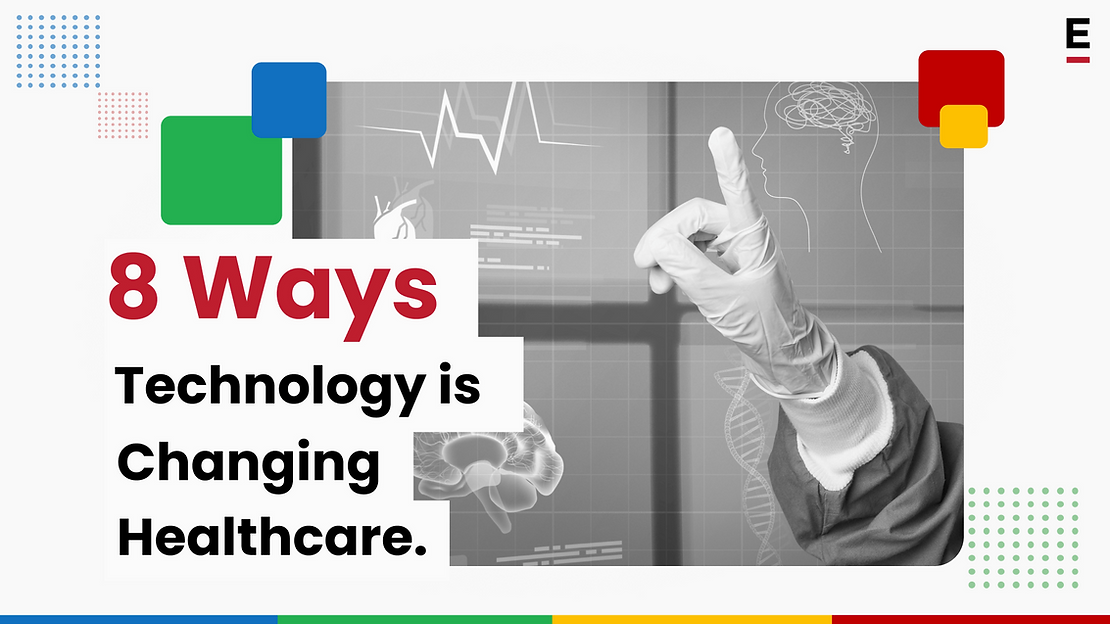Despite the chaos created by COVID-19, a technological revolution and an overall fostering of innovation in the world turned out to be a welcome change. The healthcare industry needed a technological arm for its infrastructure, patient care, and social agendas. With that in mind, the technology in healthcare mainly focuses on quality care, workforce management, productivity, and operational processes. IT companies are using innovative technologies and are skillfully applying their knowledge through tools, devices, and modern innovations to solve pain areas in healthcare. These technologies enhance patient access and provider capabilities by supporting educational, informational, rehabilitative, therapeutic, preventive, and diagnostic solutions.
The $2 trillion healthcare sector is undergoing a technological revolution aiming to reduce surging costs and logistical inefficiencies. From electronic health records to telemedicine to robotic surgeries, healthcare is entering a new age of technology-driven, value-based care. Here are some ways in which the role of technology in healthcare promises to bring about changes in the world,
Disease Diagnosis and Treatment
Technological innovations have proven to be an invaluable asset in the early diagnosis of diseases. For instance, Artificial Intelligence (AI) is being used to detect early-stage heart disease and other life-threatening health conditions with increasing accuracy.
The use of technology has been integrated with a variety of diagnostic fields such as pathology and genetics. This has enabled professionals to essentially eliminate the scope for error by not relying solely on human findings. Healthcare technology services have helped doctors devise personalized patient treatment plans, allowing for better disease management.
Medical Imaging
Medical imaging, also known as radiology, is a medical discipline in which body parts are recreated for diagnostic or treatment purposes. Advancements in traditional medical imaging technologies such as X-ray and CT scans have enhanced the ability of doctors to analyze conditions not visible to the human eye.
AI has aided the development of optimal imaging solutions, enabling doctors to identify medical abnormalities faster and start treatment immediately. The development of platforms like PACS (Picture Archiving and Communications System) has also made it possible to view medical images from various devices.
Healthcare Operations or Surgeries
Emerging tech, including Virtual Reality (VR), has assisted medical professionals in conducting non-invasive operations and open-heart surgeries. Technology has enhanced the capability of surgeons to the extent that Augmented Reality (AR) now provides doctors access to the 3D spinal anatomy of a patient during surgery.
15% of all surgical operations in the US used robotic support in 2020, a figure that is likely to increase in the future owing to the rapid development of technologies such as bio-printing and VR.
Clinical Research
Social media have facilitated the recruitment of patients for clinical trials and research, along with mobile applications designed for this purpose. Medical professionals have successfully leveraged these technologies to enlist a diverse group of communities in their research.
Mobile wrist bands and smartphone health trackers carry the significant potential to capture patient data accurately. Doctors and researchers can remotely always monitor this data, improving disease assessment and understanding of treatment efficacy.
Administrative Applications
Healthcare technology has developed a host of administrative applications. For instance, IT applications in healthcare are increasingly being utilized for recording patients’ answers to preliminary medical questions. This enables doctors to save up on time during physical appointments.
AI provides hospitals with accurate data regarding peak business hours and helps them schedule their staff’s shifts accordingly.
Drug Development
Drug development has benefited greatly due to the advent of technology. Machine learning (ML) has catalyzed a revolution in drug trials and development, allowing healthcare agencies to identify suitable patients for trials and obtain electronic consent from them.
Technological advancements in this field have also enabled researchers to identify ideal chemical combinations for different types of drugs, helping speed up the drug development process.
Fitness
The rapidly evolving fitness applications of HealthTech now extend to wearable bands and smartphone applications. These tools track multiple bodily functions, including heart rate, sleep cycles, exercise regimes, etc.
Medical professionals can now analyze real-time data, helping patients make informed choices to prevent ailments well ahead of time.
Mental Health
Healthcare technology has made a remarkable difference in the sphere of mental health. Telemedicine and online consultation with mental health professionals have become tools for patients to circumvent the societal stigma attached to seeking therapy.
In addition, emerging techniques such as exposure therapy enable patients to build a resistance against past traumas until they quit affecting the individual. Cognitive-behavioral therapy (CBT) and other initial diagnoses no longer require a patient to meet with the doctor physically.
The HealthTech adoption has increased dramatically over the past few years, and the industry will continue to see technological advancements. But the healthcare landscape we see today is more fast-paced, patient-friendly, and accessible than ever before. It will be an exciting time to watch and benefit from these technological healthcare advances that will only improve with time. Stay tuned for more blog posts on HealthTech in the coming weeks!




